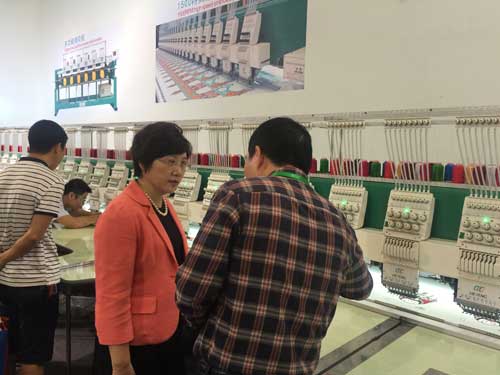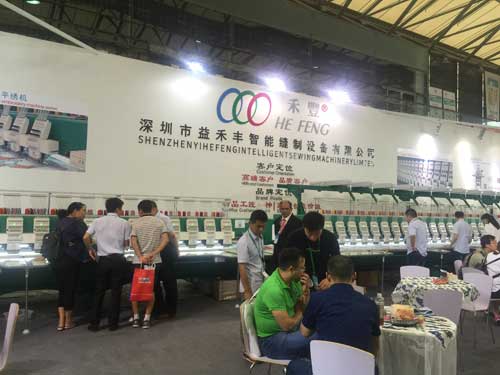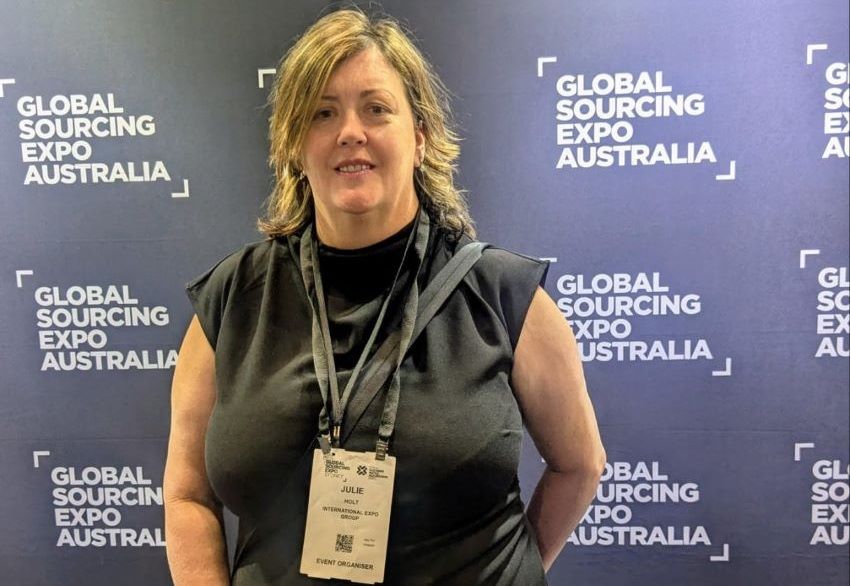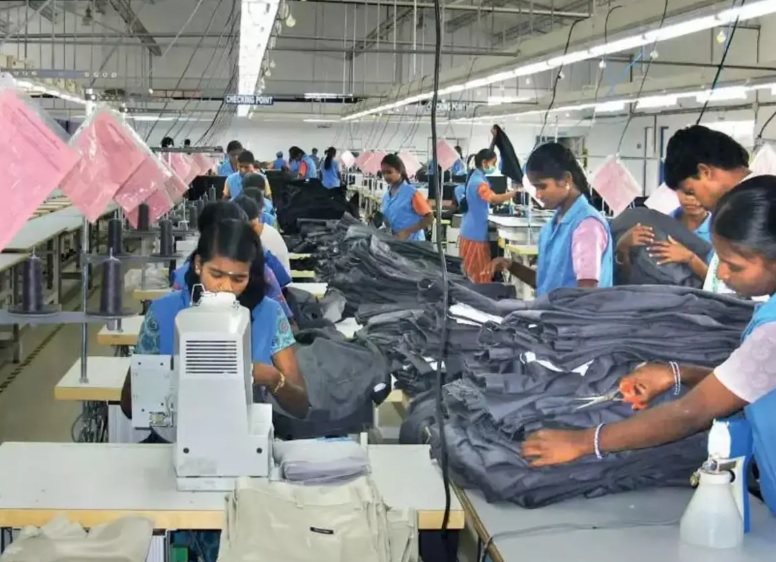FW
American & Efird (A&E) the industrial textile manufacturer has launched a new recycled polyester sewing thread designed especially for athletic wear and high-performance apparel. The new air-entangled sewing thread is made with Repreve recycled polyester, a brand of US yarn supplier Unifi.
The thread is derived from recycled post-consumer plastic bottles and aims to provide textile manufacturers within the performance apparel, active wear, athleisure, and intimate apparel markets a recycled alternative to existing sewing threads.
The launch comes at the same time as the company has expanded its zero-waste-to-landfill facilities in the US to seventeen, with four more facilities expected to recycle 100 per cent of its waste in 2018.
The textile thread manufacturer achieved its initial targets for zero-waste-to-landfill in 2015 and has been converting more facilities since then. One T-shirt can be made using the new fiber derived directly from the recycling of only six plastic bottles. Unifi has recycled over four billion plastic bottles since the brand was launched and it now supplies materials to companies such as Ford, Patagonia and Fossil.
Unifi has blends of Repreve Permacore core-spun polyester thread and Wildcat textured polyester sewing thread.
Premiere Vision is positioning itself to meet future market developments. Drawing on its long-standing relationship with the fashion industry, Premiere Vision’s marketplace aims to accompany the profound changes in an industry seeking accelerated product renewal, and a shorter time-to-market.
Premiere Vision is the world leader in trade fairs for the upstream side of the creative fashion industry. Marketplaces have conquered the B to C markets by integrating e-commerce sites. This technology offers new business opportunities to professional markets as well.
The Premiere Vision Marketplace will be simultaneously a B-to-B e-commerce site; an editorial platform based on seasonal fashion trends and product trend information produced by the group’s in-house team; and a service provider for the fashion industry to facilitate connections between exhibitors and buyers.
As a true strategic project for the Premiere Vision Group, the marketplace will make it possible to support business development of its exhibitors in international markets, as products put on line will be immediately available worldwide; connect industry players 365 days a year, beyond the show periods; adapt to the new accelerated pace of more diversified collections; and accompany evolutions in the fashion sector and the arrival of new generations of buyers and designers who expect connected tools.
Walt Disney is redesigning its retail stores after seven years. Interactive experiences will be added with live streams of theme park parades. The world’s largest entertainment company is also launching a new shopping website.
Sale of toys, clothing and other merchandise are one way Disney generates revenue from its popular characters and inspires loyalty among fans. Disney’s physical stores are an important part of those sales. Disney now operates 340 retail stores around the world. In the newly designed stores, kids can battle Darth Vader on a giant video screen or interact with other characters from the Disney, Pixar, Star Wars and Marvel franchises. Store employees can tailor experiences for children celebrating a birthday, a good report card or another milestone. The same screen will show live feeds of parades at Disney theme parks.
The revamped stores feature a smaller collection of products, with employees and signs directing shoppers to a much broader array for all ages on Disney’s website. The retail spaces also have a new look that includes lower fixtures that make them feel more open. Disney’s retail stores’ operating income in the nine months through July 1 was 11 per cent of the company’s total revenue.
Hefeng Electronics, based in China, is a high-tech enterprise, focusing on the research, development, manufacture, sale and service of computerized embroidery machines.
Hefeng, set up ten years ago, strives to be China’s best embroidery machine brand. The company strives for perfection, brings together the industry’s outstanding research, development, design, manufacture, sales and service teams, uses mature modern embroidery technology and sophisticated parts, constantly rolling out new generation, high efficiency, high quality intelligent embroidery machines.
The vision is to be service-based, and survive on quality, and development with technology and establish a win-win and mutually beneficial cooperation with a vast number of clients and create a more beautiful tomorrow.
Hefeng was founded in 2004. Its production base in Jiangxi province covers an area of 33,000 square meters. The company’s annual output can be more than 1000 sets. It has excellent cutting technology and also has unique insights in flat embroidery. At CISMA, the company has sent a strong marketing team, including product managers and technique experts.
Online eyewear retailer Lenskart Solutions has invested $1 million for a minority stake in US-based start-up Ditto, which develops graphical 3D models for Lenskart’s virtual trial feature. The online retailer already employs Ditto’s 3D try-on feature on its website and app. Ditto is an e-commerce portal that claims to use patented technology to help users find the right set of eyewear.
Lenskart stated that it will increase Ditto’s usage to improve user engagement on its platform. For instance, Lenskart users will now be able to share images of themselves trying different glasses and frames on social media. The online trial feature also provides preferences and historical data to make frame selection faster for online buyers.
Ditto provides the patented 3D virtual try-on technology that allows customers to see themselves in eyewear in 180° angles. There has been commendable response as there are over 10,000 trials every day. With this association, Ditto has now become a strategic partner for Lenskart, says Lenskart chief executive Peyush Bansal.
The development comes at a time when Lenskart is expanding its supply chain and retail store network. It also announced plans to invest Rs 100 crore in the next two years to fund its store expansion. Lenskart has raised more than $120 million from venture capital firms and other funds till date. The founded in 2010 is a fully online store and started selling offline in 2014. It currently sells in over 350 offline stores in 95 cities in India.
Max has opened a flagship in Kolkata, spread across 11,745 sq ft and four floors. Considering the positioning and location, special attention has been given to material starting from the store facade to the interiors. The store façade boasts of an international look while there are four screen video walls as well showcasing the latest fashion in digital language, reaching out to the shoppers on the high street like a billboard. All four floors consistently deliver the latest seasonal looks. Iconic photos from the daily life of Kolkata have been framed on the wall of the staircase of this 80 year old building.
Samsung panels have been used as video walls while Bangalore-based Nusyn Digital Solutions has worked on the digital content management. The store also features mannequins that have been delivered by Bangalore-based Indo-Nippon while the roto moulded polyethelene torsos have been acquired from New Zealand. Max has now reached a mark of 190 stores across the country and plans to add 45 more stores by end of this fiscal. Max is a value fashion chain from the Landmark Group and was launched in 2004 in India.
After the success of ayurvedic and herbal household products in the Indian market, Baba Ramdev’s Patanjali be launching its line of apparel, with an initial sales target of Rs 5,000 crores. This will include everything from knitwear, denim, underwear to ethnic and sportswear. Ramdev, hopes to break the stranglehold of foreign manufacturers through this business.
Patanjali Ayurved has achieved a tremendous presence around the globe and throughout India since its inception in 2006. Patanjali, with a turnover of Rs 10,561 crores in fiscal year ’17, has been in close competition with major global brands. It is the second-largest pure-play FMCG giant after market leader Hindustan Unilever.
Acharya Balkrishna, the CEO, is the eighth richest Indian. A confidant of Baba Ramdev, Balkrishna holds a 94 per cent stake in Patanjali Ayurved. Patanjali wants to raise long-term project finance to fund its upcoming food parks. The company, which currently has 50 manufacturing units, wants to scale up production at its existing facilities in Maharashtra, Assam, Andhra Pradesh, Madhya Pradesh, Uttar Pradesh and Uttarakhand. Relatively lower selling and administrative overheads have enabled the company to maintain its healthy profitability margins in a highly competitive market.
US fashion house Ralph Lauren has launched a drive to clean up the Indian market of fake and counterfeit products mostly under its Polo brand, before opening its store in the country possibly next year. Ralph Lauren’s lawyers last week conducted raids on a Hyderabad-based company that operated half a dozen ‘Lauren Polo’ branded outlets and seized 6,000 shirts, Tshirts, jeans and other products with the Polo logo.
S K Bansal, a lawyer representing Ralph Lauren stated this was a big seizure and more than 6,000 pieces of garments were seized and their hoardings were removed. He further stated the company has filed around 60 cases in various courts over the years against companies and individuals that manufactured or sold counterfeit Polo Ralph Lauren products.
Jagdeep Kumar Sharma, a lawyer stated that they confiscated about 900 trousers, about 500 shirts and others after the raids on Lauren Polo outlets. The company is planning to change name of its five outlets after coming since it has come under “objection”.
According to the sources, Ralph Lauren, which sells fashion clothing and accessories for men, women and kids, is in talks with Aditya Birla Fashion and Retail for opening to open franchisee Ralph Lauren-branded brick-and-mortar outlets. The company launched by US fashion designer Ralph Lauren is also in negotiations with Myntra for online selling rights.
India has slashed duty drawback rates from October 1. Drawback is the refund of certain duties, internal revenue taxes and certain fees collected upon the import of goods when goods are then used for export. The slash would likely lead exporters to raise prices to balance the loss of revenue from the refund. The rates were lowered in 2016 as a boost to the apparel and textile industry, but the incentive program ended.
The new all industry rates for cotton garments was dropped to two per cent from 7.7 per cent while the duty drawback rate on garments containing cotton and manmade fiber blends will be 2.5 per cent compared to the existing 9.5 per cent and the rate on garments made of manmade fibers will also be 2.50 per cent compared to 9.8 per cent currently.
Clothing items made of silk will be subject to a rate of 4.8 per cent compared to the earlier 7.6 per cent while the rate on wool apparel will also come down to 3.5 per cent from 8.7 per cent. But apparel exporters are not too pleased. They say, in the absence of encouraging drawback rates, exports will further witness a sharp decline just ahead of the peak festival season when the industry was expecting recovery. They say the apparel industry needs to book orders in advance for the next season and the present new rates are unacceptable.
In its latest Asian Development Bank (ADB) report has maintained its April projection for Cambodia's economic growth at 7.1 per cent in 2017 and 2018. The Southeast Asian country's growth is mainly driven by garment export, tourism, agriculture and construction.
Cambodia's economy continues to expand at a robust pace, propelled by export diversification, strong construction and tourism activities, better weather conditions, and supportive fiscal policy, Samiuela Tukuafu, ADB Country Director for Cambodia.
According to the lender's updated report, merchandise exports as indicated by customs data rose by 7.7 per cent and imports by 8.1 per cent in the first half of 2017. The report also stated that inflation averaged 3.3 per cent in the first seven months of 2017. Adding that per month, inflation was highest at 4.2 per cent in March and lowest at 2.3 per cent by July due to softer fuel and food prices.
The average inflation is forecast to come in at 3 per cent in 2017, and edge up marginally to 3.2 per cent in 2018.














